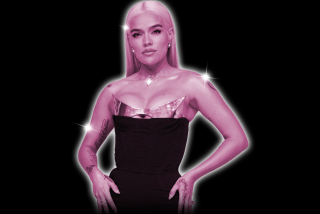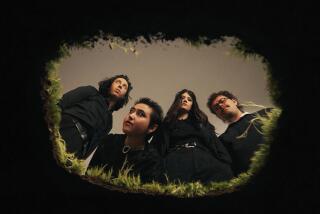Finding dark music in Max Payne’s world
“This is music for shootin’ people in the face,” jokes Jake Duzsik, lead singer of the experimental L.A.-based rock band Health as he listens to the single “Tears,” which the band recorded as part of the soundtrack it created for the recently released video game Max Payne 3. “It’s for the ladies.”
The third installment of the Max Payne video game series, which sold 3 million copies during its initial launch May 15, is this year’s blockbuster offering from the influential and profitable Rockstar Games. The game is celebrated for its brutal noir-style action sequences, but this title is also receiving praise for its groundbreaking soundtrack.
It’s the first time a popular rock band has written a full-length score for a major gaming title, and Health’s brooding sound and ethereal melodies lend emotional depth to the action. The writing process was grueling — there are 14 missions (or levels) in the game, and each has its own mini-score and motifs cued to a player’s actions.
The task took the band nine months to complete and resulted in six hours of music. Not only does the score represent a new avenue for artistic depth in gaming, but it could expose Health to a broad new audience.
“In the U.S. Health sold 10,000 copies of its last album, and this game will sell millions of copies,” says Ivan Pavlovich, soundtrack supervisor for Rockstar Games, adding that a trailer for the game featuring “Tears” played before all screenings of “The Avengers” on the film’s opening weekend.
Pavlovich sits with the band at Electro-Vox Recording Studios on Melrose, across from Paramount, to complete the final mixes for the soundtrack. “We took a big risk taking on a band like this, and they took a big risk on us,” he says. “But it really paid off, this ups the ante for all soundtracks.”
Generally, big-budget games are scored by a handful of regular composers using orchestral computer programs, which tend to sound similar to one another. That approach has resulted in some memorable music, but nothing that really stands on its own as a work of art, says Dave Verble, an Austin, Texas-based game developer who has played the Max Payne 3 demo.
“As games get more cinematic, their soundtracks need to become more cinematic, so bringing in an actual band is changing the aesthetics,” Verble says. “Rather than ambient sound you’ve got a dramatic score — there’s nothing wrong with ambient sound, but to have an identifiable pulse of soundtrack to go along with a game goes a long way to unify the experience.”
Health’s Max Payne 3 soundtrack was released as a stand-alone album Wednesday, and the song “Tears” was issued as a single on iTunes on May 15. “Tears” is at No. 21 on the iTunes Soundtracks Top 100 chart, beneath songs by Taylor Swift and Bruno Mars for major motion pictures including “The Hunger Games” and “The Twilight Saga: Breaking Dawn.”
Max Payne 3 follows the story of its eponymous antihero — an alcoholic, pill-addicted ex-cop who finds himself working for a wealthy family in São Paulo, Brazil, where a kidnapping leads to blood-soaked mayhem.
“We wanted the soundtrack to capture Max’s inner struggle and turmoil,” Pavlovich says. “But it’s also a full-on action game, so we needed a driving sound too.”
“Tears” certainly fills the bill — a somber lament featuring pummeling drums and a crushing bass line, the song zeros in on the emotional subtext of the game’s gritty action sequences with Duzsik’s eerie choir-boy voice floating wraith-like above intense grooves.
Health’s music has long held an epic cinematic appeal. Its 2010 single “We Are Water” was directed by Eric Wareheim and features a hyper-violent, video-game-like death of an underwear-clad killer at the hands of a cross-dressed boy. The band’s reputation and its devoted fan base were among the main reasons that Pavlovich tracked down Health when it was playing a show in New York City.
“We knew we could really promote this band, they have such a hard-core following of people who love them and their music,” Pavlovich says. “I don’t know how you promote Hans Zimmer.”
The band is excited by all the attention the soundtrack is getting, but mostly it is just relieved to be done. A week before the game’s launch, Duzsik and bandmates bassist John Famiglietti and guitarist Jupiter Keyes (drummer B.J. Miller wasn’t present) are bleary-eyed and wiped out but not without their signature sense of deadpan irony.
“We were supposed to be done in January,” Duzsik says, a black baseball cap pulled low on his brow, explaining that the game’s release got delayed and the designers kept returning to the band for changes. “We don’t really like working on music.”
But collaborating with Rockstar was unique, and it forced the band to stretch the limits of its creative process.
“We had to recombine and try so many new things that we now have a bunch of new sounds,” Duzsik says. “And that’s fundamental to us as a band. That part was really good.”
Duzsik doesn’t consider himself a gamer, although he played a decent amount of Grand Theft Auto (an earlier Rockstar Games mega-hit) in college. But Famiglietti plays video games while riding his stationary bike for exercise every morning. His understanding of the way music is experienced in a video game while a player is distracted by action — and excessive gunfire — was crucial to the band’s success in scoring the game, which it did mostly using video captures that Rockstar sent from its New York City headquarters.
“That was of paramount importance to the developers,” Duzsik says as Famiglietti sends out Facebook invites to the band’s soundtrack release party at Pehrspace in L.A.’s Filipinotown. “Because at the end of the day it’s about the experience of game play.”
Plus the time you spent playing the game can come back to you in waves when you hear Health’s music, says Verble, which is a great marketing tool for the game.
“You get the remembrance of the gaming experience outside of the game,” Verble says. “The music brings back the feelings you had while playing.”
And those feelings were likely pretty intense.
“It’s a lot of sad, melancholic stuff,” Duzsik says. “Max Payne is lost, he’s confused, he’s killed, like, 20,000 people. We’re trying to mirror his story and it’s not a happy story.”
ALSO:
That ‘Look of Love’ between LACMA and Hollywood
Curt Schilling shutters his game studios
John Adams tests his own faith tackling the Crucifixion of Jesus
More to Read
The biggest entertainment stories
Get our big stories about Hollywood, film, television, music, arts, culture and more right in your inbox as soon as they publish.
You may occasionally receive promotional content from the Los Angeles Times.











